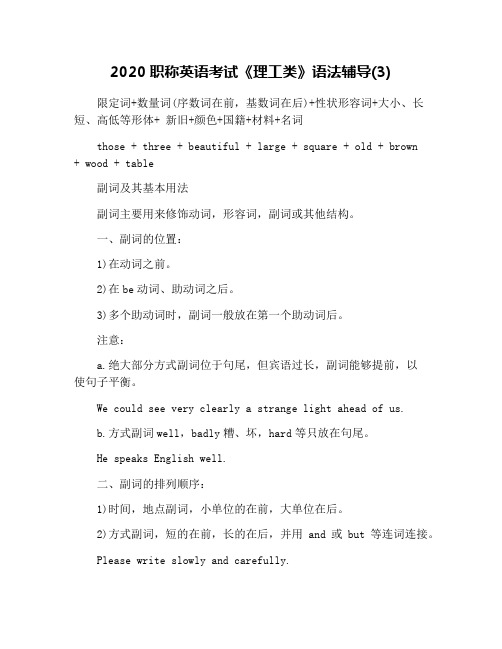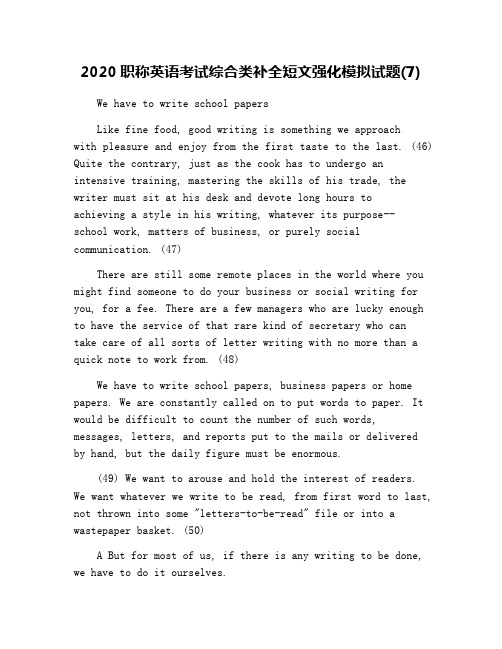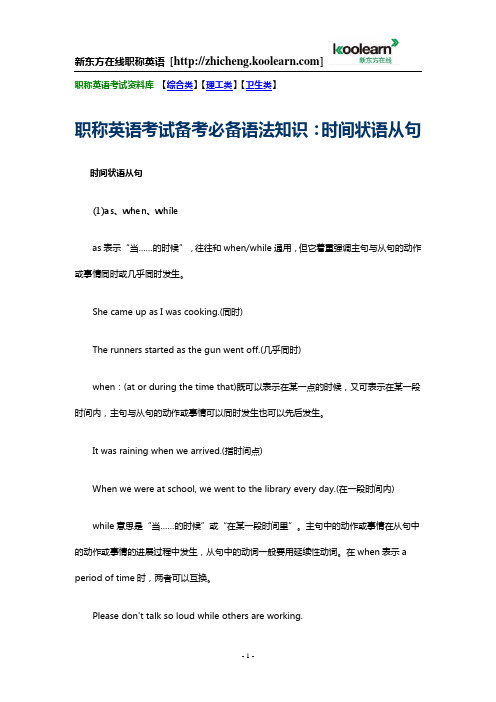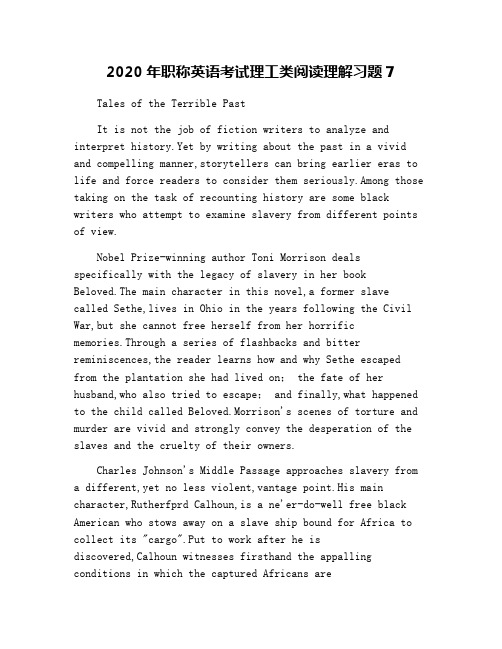2020职称英语考试理工类基础语法综合复习7
- 格式:docx
- 大小:37.10 KB
- 文档页数:1

xx年职称英语考试《综合类》语法汇总1)疑问代词在句中起名词词组的作用,用来构成疑问句。
疑问代词有以下几个:指人:who,whom,whose指物:what既可指人又可指物:which2)疑问代词在句中应位于谓语动词之前,没有性和数的变化,除who之外也没有格的变化。
what,which,whose还可作限定词。
试比较:疑问代词:What was the directional flow ofU.S.territorial expansion?美国的领土扩张是朝哪个方向的?限定词:What events led to most of the east of theMississippi River being part of theUnited States?哪些事件使密西西比河以东的大部分土地归属于美国?注意:1)无论是做疑问代词还是限定词,which 和 what 所指的范围不同。
what所指的范围是无限的,而which那么指在一定的范围内;2)Whom是who的宾格,在书面语中,它作动词宾语或介词宾语,在口语中作宾语时,可用who代替,但在介词后只能用who;3)疑问代词用于对介词宾语提问时,过去的文体中介词和疑问代词通常一起放在句首,现代英语中,疑问代词在句首,介词在句未;4)疑问代词还可引导名词性从句。
1)关系代词用来引导定语从句。
它代表先行词,同时在从句中作一定的成分,例如:The girl to whom I spoke is my cousin. 跟我讲话的姑娘是我表妹。
(该句中whom既代表先行词the girl,又在从句中作介词to的宾语。
)2)关系代词有主格,宾格和属格之分,并有指人与指物之分。
在限定性定语从句中,that 可指人也可指物例如:This is the pencil whose point is broken.这就是那个折了尖的铅笔。
(whose 指物,在限定性定语从句中作定语) He came back for the book which he hadforgotten.他回来取他丢下的书。

2020职称英语考试《理工类》语法辅导(3)限定词+数量词(序数词在前,基数词在后)+性状形容词+大小、长短、高低等形体+ 新旧+颜色+国籍+材料+名词those + three + beautiful + large + square + old + brown+ wood + table副词及其基本用法副词主要用来修饰动词,形容词,副词或其他结构。
一、副词的位置:1)在动词之前。
2)在be动词、助动词之后。
3)多个助动词时,副词一般放在第一个助动词后。
注意:a.绝大部分方式副词位于句尾,但宾语过长,副词能够提前,以使句子平衡。
We could see very clearly a strange light ahead of us.b.方式副词well,badly糟、坏,hard等只放在句尾。
He speaks English well.二、副词的排列顺序:1)时间,地点副词,小单位的在前,大单位在后。
2)方式副词,短的在前,长的在后,并用and或but等连词连接。
Please write slowly and carefully.3)多个不同副词排列:水准+地点+方式+时间副词。
兼有两种形式的副词1)close与closelyclose意思是近;closely 意思是仔细地He is sitting close to me.Watch him closely.2)late 与latelylate意思是晚;lately 意思是最近You have come too late.What have you been doing lately?3)deep与deeplydeep意思是深,表示空间深度;deeply时常表示感情上的深度,深深地He pushed the stick deep into the mud.Even father was deeply moved by the film.4)high与highlyhigh表示空间高度;highly表示水准,相当于muchThe plane was flying high.I think highly of your opinion.5)wide与widelywide表示空间宽度;widely意思是广泛地,在很多地方He opened the door wide.English is widely used in the world.6)free与freelyfree的意思是免费;freely 的意思是无限制地You can eat free in my restaurant whenever you like. You may speak freely;say what you like.。

2020职称英语考试综合类补全短文强化模拟试题(7) We have to write school papersLike fine food, good writing is something we approachwith pleasure and enjoy from the first taste to the last. (46) Quite the contrary, just as the cook has to undergo an intensive training, mastering the skills of his trade, the writer must sit at his desk and devote long hours toachieving a style in his writing, whatever its purpose--school work, matters of business, or purely social communication. (47)There are still some remote places in the world where you might find someone to do your business or social writing for you, for a fee. There are a few managers who are lucky enough to have the service of that rare kind of secretary who cantake care of all sorts of letter writing with no more than a quick note to work from. (48)We have to write school papers, business papers or home papers. We are constantly called on to put words to paper. It would be difficult to count the number of such words, messages, letters, and reports put to the mails or deliveredby hand, but the daily figure must be enormous.(49) We want to arouse and hold the interest of readers. We want whatever we write to be read, from first word to last, not thrown into some "letters-to-be-read" file or into a wastepaper basket. (50)A But for most of us, if there is any writing to be done, we have to do it ourselves.B However, the managers may sometimes cause the writers a lot of trouble.C Any good writers, like good cooks, do not suddenly appear full-blown(成熟的)D What is more, everyone who writes expects, or at least hopes, that his writing will be read.E This is the reason we bend our efforts toward learning and practising the skills of interesting, effective writing.F You may be sure that the greater the effort, the more effective the writing, and the more rewarding.答案:C F A D E。

2020职称英语理工类考试基础语法综合复习1(28)fall 、drop的区别:fall指东西由高处向下坠落,不及物动词;也能够作连系动词,意思是“变得,进入某种状态”。
drop表示物体由高处往低处落下,不及物动词;或让物体落向低处,及物动词。
如:The man fell off the tractor and hurt himself. (那个人从拖拉机上摔下来跌伤了)/ Soon after they touched the pillows theyfell (系动词) fast asleep. (他们头挨枕头不久就睡着了)/ Hefelt as if he had to drop maths.(他觉得似乎要放弃数学)/ He dropped a letter into the mail-box.(他向邮箱里丢了一封信)(29)join、join in、take part in的区别:join多指参加组织、团体、党派等,后面跟人时表示和某人一起参加某项活动;join in指参加某项游戏或活动;take part in多指参加群众性的活动、运动、会议等。
如:He joined the army in 2001.(他2001年参军)/ Theyjoined me in congratulating you.(他们和我一起向你祝贺)/ Dojoin us in the game.(千万参加我们的比赛) / He took an active part in the students’ movement in the 1940s.(在二十世纪40年代他积极参加学生运动)(30)beat、hit、strike的用法区别:beat指“连续持续地打击;(心脏的)跳动”;hit指“一次性地撞击、命中”;strike与hit基本同义,还能够理解为“划(火柴)、给……深刻的印象”。
如:Theman looks dead, but his heart is still beating weakly. (那个人看上去死了可心脏还在微弱地跳动) / He hit the ball so hard that it flew over their heads and fell into the lake. (他踢球的劲太大球飞过他们的头顶落入水中) / He went into the room and struck a match(火柴). (他走进房间划着了一根火柴)。

职称英语考试资料库【综合类】【理工类】【卫生类】职称英语考试备考必备语法知识:时间状语从句时间状语从句(1)as、when、whileas表示“当……的时候”,往往和when/while通用,但它着重强调主句与从句的动作或事情同时或几乎同时发生。
She came up as I was cooking.(同时)The runners started as the gun went off.(几乎同时)when:(at or during the time that)既可以表示在某一点的时候,又可表示在某一段时间内,主句与从句的动作或事情可以同时发生也可以先后发生。
It was raining when we arrived.(指时间点)When we were at school, we went to the library every day.(在一段时间内)while意思是“当……的时候”或“在某一段时间里”。
主句中的动作或事情在从句中的动作或事情的进展过程中发生,从句中的动词一般要用延续性动词。
在when表示a period of time时,两者可以互换。
Please don't talk so loud while others are working.He fell asleep while/when reading. Strike while the iron is hot.(用as或when不可,这里的while意思是“趁……”)(2)引导时间状语从句的连接词除上述外还有:①till、not…until…、until、before、sinceDon't get off the bus until it has stopped.He waited for his father until(till)it was twelve o'clock.It will be five years before he returns from England.更多职称英语免费资料请访问:/。

2020年职称英语考试理工类阅读理解习题7Tales of the Terrible PastIt is not the job of fiction writers to analyze and interpret history.Yet by writing about the past in a vivid and compelling manner,storytellers can bring earlier eras to life and force readers to consider them seriously.Among those taking on the task of recounting history are some black writers who attempt to examine slavery from different points of view.Nobel Prize-winning author Toni Morrison dealsspecifically with the legacy of slavery in her book Beloved.The main character in this novel,a former slave called Sethe,lives in Ohio in the years following the Civil War,but she cannot free herself from her horrificmemories.Through a series of flashbacks and bitter reminiscences,the reader learns how and why Sethe escaped from the plantation she had lived on; the fate of her husband,who also tried to escape; and finally,what happened to the child called Beloved.Morrison's scenes of torture and murder are vivid and strongly convey the desperation of the slaves and the cruelty of their owners.Charles Johnson's Middle Passage approaches slavery from a different,yet no less violent,vantage point.His main character,Rutherfprd Calhoun,is a ne'er-do-well free black American who stows away on a slave ship bound for Africa to collect its "cargo".Put to work after he isdiscovered,Calhoun witnesses firsthand the appalling conditions in which the captured Africans aretransported.When they finally rebel and take over the ship,he finds himself in the middle —— and is forced to come to terms with who he is and what his values are.Neither Beloved nor Middle Passage is an easy read,but both exemplify African American writers' attempts to bring significant historical situations alive for a modem audience.注释:1.Yet by writing about the past in a vivid and compelling manner,storytellers can bring earlier eras to life and force readers to consider them seriously.不过通过用一种生动有趣的方式来描写过去,小说家能够将早期时代重现,并引起读者的重视。
2020职称英语考试理工B必备语法知识(1)词类、句子成分和构词法(一)词类英语词类分十种:名词、形容词、代词、数词、冠词、动词、副词、介词、连词、感叹词。
1.名词(n.):表示人、事物、地点或抽象概念的名称。
如:boy, morning, bag, ball, class, orange.2.代词(pron.):主要用来代替名词。
如:who, she, you, it .3.形容词(adj..):表示人或事物的性质或特征。
如:good,right, white, orange .4.数词(num.):表示数目或事物的顺序。
如:one, two, three, first, second, third, fourth.5.动词(v.):表示动作或状态。
如:am, is,are,have,see .6.副词(adv.):修饰动词、形容词或其他副词,说明时间、地点、水准等。
如:now, very, here, often, quietly, slowly.7.冠词(art..):用在名词前,协助说明名词。
如:a, an, the.8.介词(prep.):表示它后面的名词或代词与其他句子成分的关系。
如in, on, from, above, behind.9.连词(conj.):用来连接词、短语或句子。
如and, but,before .10.感叹词(interj..)表示喜、怒、哀、乐等感情。
如:oh, well, hi, hello.(二)句子成分英语句子成分分为七种:主语、谓语、宾语、定语、状语、表语、宾语补足语。
1.主语是句子所要说的人或事物,回答是“谁”或者“什么”。
通常用名词或代词担任。
如:I’m Miss Green.(我是格林小姐)2.谓语动词说明主语的动作或状态,回答“做(什么)”。
主要由动词担任。
如:Jack cleansthe room every day. (杰克每天打扫房间)3.表语在系动词之后,说明主语的身份或特征,回答是“什么”或者“怎么样”。
2020职称英语考试理工类基础语法综合复习7
3)如果“have”作“有”讲,也能够在它后面加not构成否定式,
其形式与have got的否定式相同。 如:I haven’t (got) any
brothers or sisters.(我没有兄弟姐妹)
have 的否定形式:
当表示“有”的意思时,能够采用以下三种形式:have+not;do
not+ have; have+ no+ n. 如:I have not enough food to eat.= I
do not have enough food to eat. =I have no enough food to eat.
当have为助动词时,用“have+ not”结构。如:I have not
been toShanghai。
当have既不表示“有”,也不作助动词用时,用“do not+ have”
结构。I didn’t have breakfast this morning.
具体到反义疑问句中,则遵循以下原则:
a.当have表示“有”含义时,反意疑部问部分能够用have形式,
也能够用do形式。例如: He has a book in his hand, hasn't he?
He has a book in his hand, doesn't he? b.当陈述部分的动词是
have“有”的否定形式时,反意疑问部分是用have形式还是用do形
式,取决于陈述部分的动词形式。例如: You haven't a car, have
you? You don't have any money with you, do you? c.当have不表
示“有”含义而表示其他含义时,反意疑问句则必须用do的形式。例
如: We had a good time in the vacation, didn't we? He has
his breakfast at seven everyday, doesn't he? You have to get
up early tomorrow, don't you?